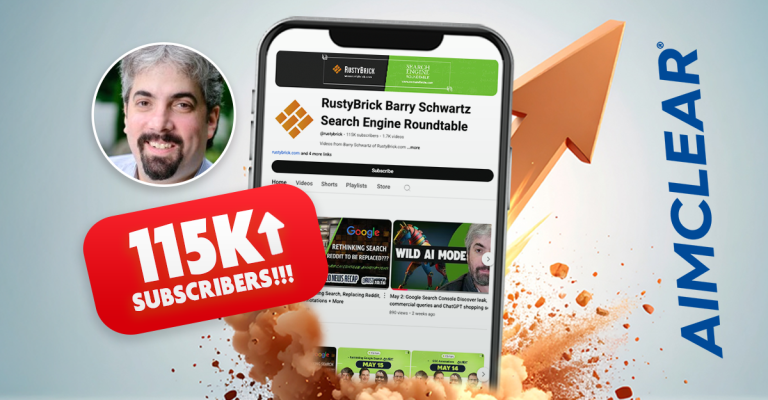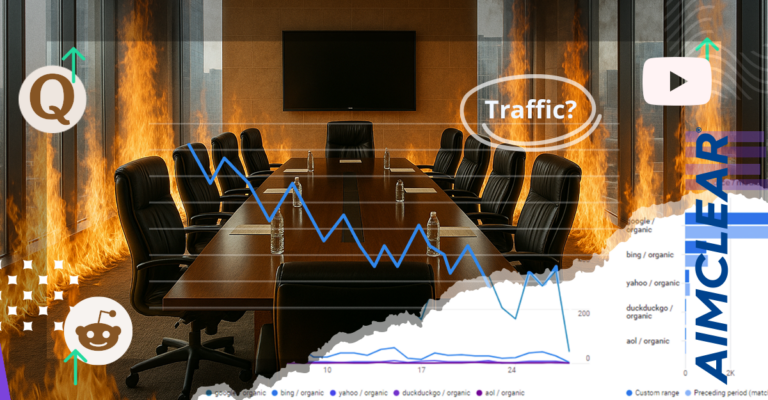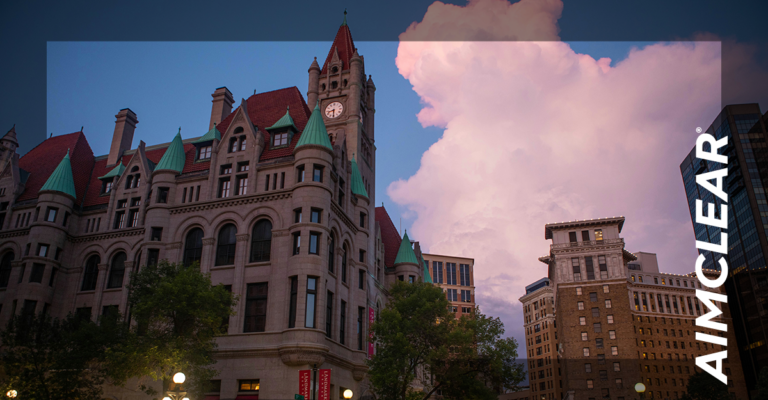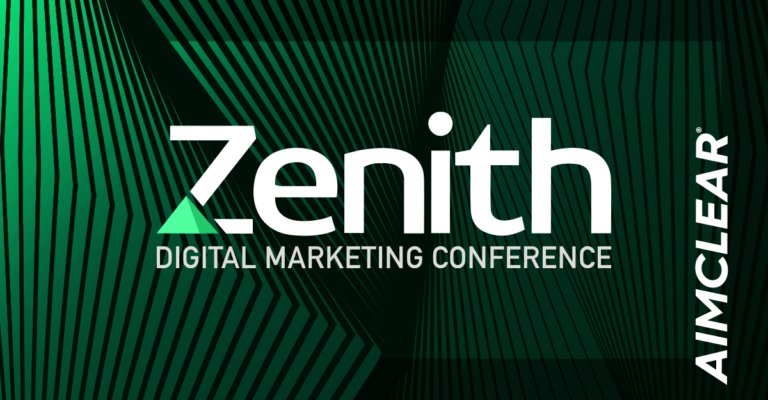Working at an online marketing agency, sometimes one can’t help but wonder what a day-in-the-life is like for an in-house employee. Vice versa, for sure. Same with a professional steeped in search vs. paid. Often, there are separate marketing departments dedicated exclusively to one or the other. Of course, there are hybrid-marketer exceptions. Ruth Burr is one such exception.
Currently Lead SEO with Seattle-based SEOmoz, Ruth’s seen both sides of both fences. Ample experience working agency-side and in-house on a blend of SEO and PPC projects gives her a unique, multi-layered perspective on the matter. This more than qualities her to speak on a panel dedicated to In-House SEO And PPC: What You Can Learn From Each Other, Optimally… which is just what she’ll be doing next month at #SMX West.
AIMCLEAR had the pleasure of sharing a candid Q&A with Ruth prior to the show, during which we got a special sneak peek of her upcoming presentation. We also enjoyed a glimpse into her life as a data-driven marketer and grilled cheese enthusiast, besides. Read on for the goods, including an adorable snapshot of her puppy dog(!).
| AIMCLEAR: Ruth! Welcome, welcome – glad to have you here. Tell the folks at home a bit about yourself… who are you, where do you come from, how did you wind up in the online marketing industry?

I ended up getting a marketing internship at Onvia, a business intelligence company – mostly doing data entry, making copies, that kind of stuff. Their SEO at the time, Susan Urban, found out that I could write and recruited me to help write their blog. Along the way she ended up teaching me a lot about SEO for blogs. A while later, Susan had another job opportunity; before she left, she put me through an intense 3-week “SEO boot camp” where she taught me everything about SEO she could. I ended up being the in-house SEO at Onvia for about 4 years before being laid off in a re-org.
Since then I’ve worked both in-house and agency-side, including working at a hybrid PPC/SEO agency where I handled clients who needed a bit of both. In May 2012, I was hired as the Lead SEO here at SEOmoz, where I have been working with the Product and Marketing teams both to improve SEOmoz.org’s inbound performance and to make our tools even better for SEOs like me. It’s my dream job and I couldn’t be happier doing it.
| aC: Marvelous! So, okay… on the topic of SEO: Share with us your two cents on the ever-evolving realm of SEO – what’s the different today than it was five years ago? What will always be the same?
RB: There’s a lot of “the more things change, the more they stay the same” in the SEO world. I’m naturally a very risk-averse person (I don’t even jaywalk), so I’ve always tried to take Google at their word and create good quality content, incentivize honest-to-goodness organic links and try to create good user experiences. Because of this I’ve been fortunate to avoid a lot of the suffering that Penguin and Panda caused. I would say that these are tactics that never go out of style. The way I think about it is that Google makes money by making sure people find what they’re looking for, so it’s better to try to give people what they’re looking for rather than devote time trying to find tricks and loopholes.
That said, there are lots of tactics that used to work well in the past but don’t really anymore. When I started doing SEO one of my tasks was to go in and make tiny changes to our content pieces, just like bold and unbold words and move commas and change e.g. “it’s” to “it is” and back, to keep the content “fresh.” That’s a dinosaur, that would never work now. I remember a couple of years ago PageRank sculpting and siloing was just hugely effective, and a lot of people spent a lot of time doing it – then Google realized there was no user benefit and changed the way nofollows affect link juice. These are the kinds of tactics that are in no way “black hat,” but can become more or less effective over time – so it’s important to stay on top of them.
I’m really excited about how much SEO has “grown up” in the time that I’ve been doing it. It’s so much more understood in the mainstream, and companies are starting to devote real time and resources to it. We still have a long way to go but it’s night and day compared to even 5 years ago. There are so many more tools at our disposal now, too – I think social media and sites like YouTube and Tumblr have really changed the web because now it’s so easy for anyone to create content. That means that we can engage with our customers across so many different platforms and channels. It’s possible to tell a brand story in such rich detail now.
| aC: And how! Your bio notes that you’ve worked SEO both in-house and agency-side. Can you speak a little to the pros and cons of each?
RB: Oh goodness, I could talk about this ALL DAY. I actually wrote a blog post for Search Engine People a while back on the topic.
TL;DR: Working at an agency means you can get a lot of experience in different industries/verticals, and learn from your co-workers on the daily. In the end, though, I found the stress of agency life to be almost unbearable, and it was SO FRUSTRATING to make recommendations to clients and have no way to make sure they got implemented.
Working in-house means you can go really deep on a project and keep it top of mind for company higher-ups. It also means you can get way more Inbound Marketing-y and use a bunch of different tactics and platforms to achieve your goals. However, in the past I have found that working in-house can mean becoming really isolated from your industry peers, and for some reason some companies have a harder time taking advice from an employee than a consultant. If you’re working in-house it’s really important to find continuing education and networking opportunities outside of work.
| aC: Noted. Confession time! Tell us 3 non-industry sites you visit each day 🙂 .
RB: (1) TheHairpin.com – I loves me the ladyblogs! (2) Pinterest – especially now that I’m planning my wedding. (3) AVClub.com – for some reason I get even more enjoyment out of my television watching if I can then read blogs about the television I just watched.
| aC: Hey right on, I follow you on Pinterest! Now, onto the juicy exclusive: On the afternoon of Day 3 at SMX West, you’ll be speaking on the In-House SEO And PPC: What You Can Learn From Each Other, Optimally. Can we get a little sneak peek as to what you’ll dish up to audience members?
RB: Sure! A lot of what I’ll be talking about is the fantastic opportunities for controlled testing that a PPC program can give an SEO. For example, I think Quality Score is a largely ignored factor for organic rankings; if you want to test how relevant a landing page is for a certain term and how certain tweaks will affect this, Quality Score is one way you can get some hints in that direction.
| aC: Most excellent. Lastly… lightning round! Your favorite animal, ethnic cuisine, and adult beverage, GO!
RB: My favorite SPECIFIC animal is definitely my dog Ozzie.
My favorite kind of animal is bears. Favorite ethnic food: Mexican food. Just because you can’t see me doesn’t mean I don’t want tacos. Favorite adult beverage: I love champagne and champagne cocktails, and will also drink most things with bourbon in them.
See you soon!
| aC: Cheers to that! Safe travels down to San Jose – and we’ll be seeing ya, Ruth!
—
There’s still time to register for SMX West 2013! Grab your ticket and join the fun!
photo credit: © byrdyak – Fotolia.com










